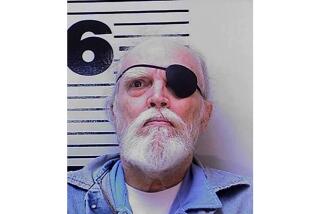Death Row Inmate Dies in Cell
- Share via
Theodore Frank, one of Ventura County’s most notorious killers whose case contributed to a campaign for tougher child-molestation laws and the ouster of a state high court justice, has died of natural causes on California’s death row.
Frank, 66, died Wednesday night of an apparent heart attack in his cell at San Quentin State Prison. His death confirmed the fears of 2 1/2-year-old Amy Sue Seitz’s relatives, who often questioned whether delays in the appeals process would allow Frank to avoid execution in the child’s 1978 torture-murder.
“We really have mixed emotions,” said Patti Linebaugh, Amy Sue’s grandmother. “This is not something you think about beforehand. You anticipate him having to face execution.”
Twice juries imposed the death penalty for Frank, whose case was reversed on appeal. And twice Frank received an execution date. Both were stayed pending further appeals.
Dist. Atty. Michael D. Bradbury said in a statement that the delay in Frank’s execution “is an indictment of the current death penalty appellate process that takes place in federal court.”
“It is long past the time that this system be revamped to assure that justice be swift and sure,” he said, describing Amy Sue’s slaying as “one of the most vicious, horrific crimes in Ventura County’s history.”
“Although man’s justice failed in this case,” Bradbury said, “God’s did not.”
At the time of his death, Frank had spent 21 years on death row, and his trial lawyer, Willard P. Wiksell, said the inmate was still years from execution.
Wiksell had represented Frank since the beginning in 1978, arguing at trial that his client was a mentally disturbed man who needed treatment--not execution.
After receiving news of his former client’s death, Wiksell said his thoughts turned to Amy Sue’s family.
“I hope it brings closure and relief,” he said. “They had to suffer through what can only be described as a never-ending nightmare.”
Amy Sue was abducted from her baby-sitter’s frontyard in Camarillo on March 14, 1978. Her body was found two days later in Topanga Canyon. She had been force-fed beer, tortured with locking pliers, raped and strangled.
Police arrested Frank, who had a history of molesting children and had been released six weeks earlier from Atascadero State Hospital, where he was sent for sexually assaulting a 4-year-old girl.
In 1979, a Ventura County jury found him guilty in Amy Sue’s slaying. In January 1980, Frank was sentenced to death.
Five years later, the conviction was upheld by the California Supreme Court. But the death sentence was overturned.
The justices ruled the personal diaries in which Frank rhapsodized about molesting children should not have been used as evidence. The diaries were seized by police during a search of Frank’s Woodland Hills apartment.
At a second sentencing hearing in Orange County, where the trial was moved because of publicity, Frank again received the death penalty--as well as a fresh opportunity for new appeals.
The Orange County verdict was affirmed by the state high court in 1990 and two execution dates were set in 1991, but later stayed.
Frank’s federal appeals have languished since 1993.
District attorney’s investigator Richard Haas, who worked on Frank’s retrial, expressed dismay at the slow appeals process.
“It is pretty pathetic when the person dies of old age 23 years after the offense,” Haas said. “No child or adult deserves to die like Amy Sue Seitz. It was exactly the type of case the death penalty was meant for.”
Frank’s crimes contributed emotional ammunition in the campaign to unseat former state Chief Justice Rose Bird and two other state Supreme Court justices. Bird had argued Frank’s conviction should be reversed.
Linebaugh, Amy Sue’s grandmother, also became involved in a court-reform group targeting Bird.
More to Read
Sign up for Essential California
The most important California stories and recommendations in your inbox every morning.
You may occasionally receive promotional content from the Los Angeles Times.













